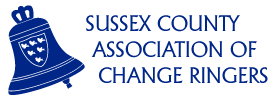Other Documents
- Details
-
Published: Monday, 02 October 2017 10:00
Listed below are documents relating to the association, covering a range of topics. If you can't find what you are looking for or you spot an omission or error, then please contact the This email address is being protected from spambots. You need JavaScript enabled to view it.
SCACR Privacy Policy
SCACR Insurance Policy (documents pending)
SCACR Health and Safety Policy PDF (docx) (Mar 2025)
SCACR Event Record Form (pdf) (docx)
SCACR District Map (basic PDF only; use the interactive Tower Map for full details)
Bell Maintenance Course Notes
Events
Event Organiser Guidelines (Nov 2020)
A Risk Assessment must be completed for all events by the organiser.
Financial Documents
Financial Policy (Oct 2024) (pdf)
Expenses Policy (Oct 2024) (pdf)
Expenses Form (Oct 2022) (pdf) (word)
Gift Aid Form (Oct 2022)
Association Rules - Competition Rules
A copy of the rules for a range of striking competitions can be found below:
SCACR Call Change Competition Rules (Western District)
SCACR Method Ringing Competition Rules (Western District)
SCACR Striking Competition Rules (Southern District)
Safeguarding Children & Vulnerable Adults
- Details
-
Published: Monday, 02 October 2017 10:00
The Association takes safeguarding of children and vulnerable adults very seriously. We have a dedicated Safeguarding Officer, and a regularly updated Safeguarding Policy (policy and other essential documents available to download below).
Towers must follow the Church of England Safeguarding Training Framework which means
- All ringers, even if the tower has no young ringers, must complete the online Basic Awareness course and renew this every 3 years.
- All tower captains and trainers, even if the tower has no young ringers, must in addition complete the online Foundation course and renew this every 3 years. In this case there is no need to renew the Basic course.
The parent or guardian of each young ringer must complete the Permission to Ring form and provide this to the organiser of the practice (e.g. the tower captain, district secretary or practice coordinator). The CCCBR Good Practice Guide should be displayed in all towers.
Anyone who regularly teaches, trains or supervises children must have a DBS check done by the parish safeguarding officer (usually a member of the PCC). Ringers in general supporting roles or who only undertake one-off teaching/deputising do not need DBS checks. “A DBS check dating from January 2022 should be renewed every 3 years (or 5 years if before January 2022). If you join the Updates scheme within 30 days of a DBS check, there is no need to renew the DBS check and other organisations can access your records (with permission) to avoid multiple checks.
So much of safeguarding is really just good practice: always obtain written parental consent to teach children and ensure that two adults are present (preferably one male and one female) when children are present. Towers are also advised to keep an attendance register, just so you can look back to see who was present at any ringing occasion.
The Central Council of Church Bell ringers have published several helpful documents, including a general Safeguarding Guidance document. We recommend that each tower keeps a copy of this in the ringing chamber.
If anyone has any worries, concerns or questions please contact the safeguarding officer: This email address is being protected from spambots. You need JavaScript enabled to view it.. You can also speak to your parish safeguarding officer or the safeguarding team at the Diocese of Chichester. The Diocese provides guidance for likely situations: "What do I do if ...".
Safeguarding advice for young ringers online
In general bellringers are lovely people but very rarely things can go wrong. To help you stay safe when ringing online:
- When you are going to a practice make sure there is someone you know and trust there.
- If someone says something inappropriate use the “Report Behaviour” link on Ringing Room and tell an adult you trust (mum or dad, tower captain or another family member).
- You can take screenshots to keep a record of conversations.
- If you need more help or don’t know who to talk to, go to cccbr.org.uk/safeguarding.
Permission forms
Permission to Ring Form (PDF) (.docx)
Permission to Ring at Association Events (PDF) (.docx)
Permission for an Additional Activity Form (PDF) (.docx)
Policy and Guidance
SCACR Safeguarding Policy
Tower Safeguarding Flowchart (PDF) (.docx)
CCCBR Safeguarding Guidance (includes Resources for Ringers and Ringing Societies)







